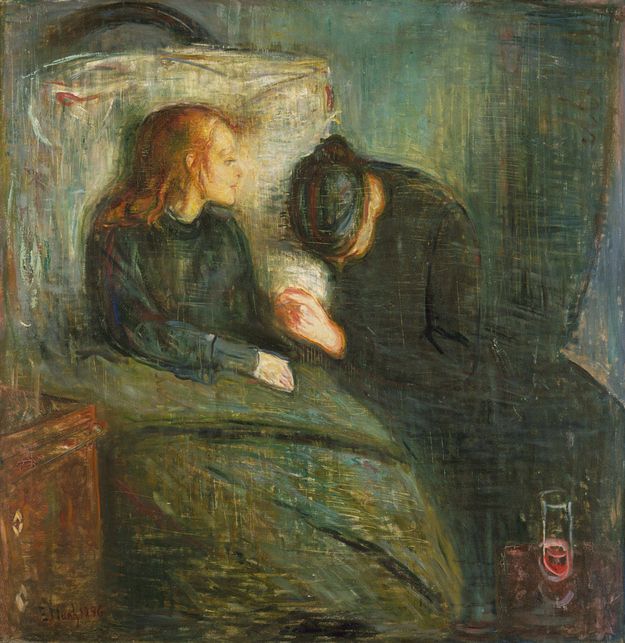Thursday
I’m currently spending the week in the Bronx with my sick friend Rachel Kranz, who has yet to be released from the hospital that we entered together over a month ago. She’s had some rough episodes since that time, including a six-minute cardiac arrest, and is now trying to clamber back to enough health that she can be released into rehab, at which point she can resume chemo for her ovarian cancer.
On Monday and Tuesday she went through a particularly rough spell. By Tuesday evening, however, she had managed to empty out some of what was wracking her body and found relief. She wanted to talk but kept falling asleep so I sat by her bedside and held her hand. As I did so, the opening lines of W. H. Auden’s “Lullaby” went through my head.
There was good reason why it did so. In unsettling ways, the much beloved lyric joins avowals of love with images of frailty and death. The poem opens with a sleeping lover lying on the arm of the speaker after the two have made love, which seems conventionally romantic. But the speaker’s arm is proving faithless—it can only stay in its position for so long—and that faithlessness leads him to meditate on all else that will pass away:
Lay your sleeping head, my love,
Human on my faithless arm;
Time and fevers burn away
Individual beauty from
Thoughtful children, and the grave
Proves the child ephemeral…
Yet in spite of this realization, which I sensed as well in the precariousness of Rachel’s health, the speaker finds “the living creature” beautiful. The sleeper may be subject to human illness and sin (“mortal, guilty”), but at this moment all the speaker sees is the beauty:
But in my arms till break of day
Let the living creature lie,
Mortal, guilty, but to me
The entirely beautiful.
The poem maintains the tension between love and frailty throughout. Everything passes, including love and fidelity, and “fashionable madmen”—think of them as know-it-all cynics who don’t believe in transcendence—say that we will suffer when we give our hearts over to the temporary. Auden describes their warnings as a “pedantic boring cry”:
Certainty, fidelity
On the stroke of midnight pass
Like vibrations of a bell,
And fashionable madmen raise
Their pedantic boring cry:
Every farthing of the cost,
All the dreaded cards foretell,
Shall be paid…
And indeed we can shut down our hearts to escape suffering. I could harden myself to Rachel’s plight. But as I sat by her, all I could think was how precious this moment was:
…but from this night
Not a whisper, not a thought,
Not a kiss nor look be lost.
Auden’s final stanza opens with the oracular power of Ecclesiastes, declaiming, “Beauty, midnight, vision dies.” In spite of this reality, however, the poem ends with a lullaby prayer. May you be welcomed by “the winds of dawn that blow/Softly round your dreaming head,” the speaker whispers. And if “noons of dryness” and “nights of insult” are ahead, as surely they are, maybe the sufferer will be sustained by “involuntary powers” (powers beyond us?) and by those who watch with “every human love.”
My prayer for Rachel wasn’t worked out in such detail as I sat with her. But Auden helped me understand my conflicted feelings.
Lullaby
By W. H. Auden
Lay your sleeping head, my love,
Human on my faithless arm;
Time and fevers burn away
Individual beauty from
Thoughtful children, and the grave
Proves the child ephemeral:
But in my arms till break of day
Let the living creature lie,
Mortal, guilty, but to me
The entirely beautiful.
Soul and body have no bounds:
To lovers as they lie upon
Her tolerant enchanted slope
In their ordinary swoon,
Grave the vision Venus sends
Of supernatural sympathy,
Universal love and hope;
While an abstract insight wakes
Among the glaciers and the rocks
The hermit’s carnal ecstasy.
Certainty, fidelity
On the stroke of midnight pass
Like vibrations of a bell,
And fashionable madmen raise
Their pedantic boring cry:
Every farthing of the cost,
All the dreaded cards foretell,
Shall be paid, but from this night
Not a whisper, not a thought,
Not a kiss nor look be lost.
Beauty, midnight, vision dies:
Let the winds of dawn that blow
Softly round your dreaming head
Such a day of welcome show
Eye and knocking heart may bless,
Find the mortal world enough;
Noons of dryness find you fed
By the involuntary powers,
Nights of insult let you pass
Watched by every human love.
Further thought – Increasingly I see the applicability of Kafka’s “Metamorphosis,” which an ALS patient, also an English teacher, used to articulate her experience. Rachel feels that she has undergone a metamorphosis that isn’t allowing her to perform actions that she once took for granted.


